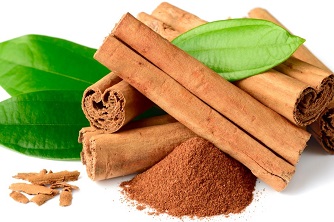Cinnamon For Flu Mar 25, 2023 2 years, 3 weeks, 5 days, 14 hours, 18 minutes ago
Cinnamon, an ancient spice obtained from the inner bark of trees belonging to the genus Cinnamomum, has been used for centuries in traditional medicine to treat a variety of ailments. In recent years, scientific studies have increasingly supported the health benefits of cinnamon, particularly its potential to combat flu infections.
 Image Credit: AmyLv / Shutterstock
Image Credit: AmyLv / Shutterstock
The distinct smell and flavor of cinnamon are due to the oily part, which is very high in the compound cinnamaldehyde, which is thought to be responsible for most of cinnamon’s health benefits.
There are two main types of cinnamon:
-Ceylon cinnamon: Also known as “true” cinnamon, which is yellowish-brown in color and usually rolled into sticks.
-Cassia cinnamon: The commonly available variety in which people generally refer to as “cinnamon.” It comes as reddish-brown pieces of thick woody bark.
Both types of cinnamon are good in terms of health benefits, but Ceylon cinnamon is the better choice if you’re going to consume it regularly. It is important to know that cinnamon contains a compound called coumarin, which can be toxic in large doses. Coumarin occurs in high concentration in Cassia cinnamon than in Ceylon cinnamon which has only trace amount.
Cinnamaldehyde, linalool, β-caryophyllene, and eugenol are the main phytochemical components of Cinnamon and its essential oil. In addition, Methyl cinnamate, Cinnamyl acetate, and procyanidin-A are other important ingredients of Cinnamon
https://www.sciencedirect.com/science/article/abs/pii/S0308814620316356
In this article, Thailand
Medical News will explore the antiviral, antioxidant and anti-inflammatory properties of cinnamon and how they can help in flu prevention and treatment. We will also provide links to relevant studies for further reading.
Cinnamon: A Powerful Antiviral Agent
Cinnamon contains various bioactive compounds, such as cinnamaldehyde, eugenol, and trans-cinnamic acid, which possess antimicrobial, antioxidant, and anti-inflammatory properties. Among these compounds, cinnamaldehyde has been identified as the most potent antiviral component.
https://journals.lww.com/md-journal/fulltext/2020/05150/effects_of_cinnamaldehyde_on_anti_respiratory.86.aspx
https://pubmed.ncbi.nlm.nih.gov/27008344/
https://www.amjmedsci.com/article/S0002-9629(15)31516-0/pdf
https://www.biomolther.org/journal/view.html?volume=25&number=3&spage=279&year=2017
t;
https://www.jmb.or.kr/journal/view.html?doi=10.4014/jmb.1508.08024
https://academic.oup.com/labmed/article/40/11/669/2657533
https://www.microbiologyresearch.org/content/journal/jgv/10.1099/vir.0.83208-0
https://journals.plos.org/plosone/article?id=10.1371/journal.pone.0165386
https://www.ncbi.nlm.nih.gov/pmc/articles/PMC5082894/
Numerous in vitro studies have shown that cinnamon has the antiviral activity of cinnamon against human influenza A and B viruses, as well as avian influenza A virus.
https://pubmed.ncbi.nlm.nih.gov/17303260/
https://www.ncbi.nlm.nih.gov/pmc/articles/PMC9693178/
https://pubmed.ncbi.nlm.nih.gov/26403820/
https://www.mdpi.com/1420-3049/27/22/7797
https://bmcvetres.biomedcentral.com/articles/10.1186/s12917-022-03183-x
Based on some of these studies that showed that cinnamon extract effectively inhibited viral replication and reduced the infectivity of the various viruses, cinnamon could be used as a natural remedy for flu infections.
Boosting Immune System Function
In addition to its direct antiviral properties, cinnamon can also boost the immune system, which is crucial for fighting off flu infections.
One study has shown that cinnamon extract could enhance the production of a type of immune cells known as CD8 T-cells, which play a critical role in defending the body against infections.
https://pubmed.ncbi.nlm.nih.gov/19203831/
Anti-inflammatory Properties That Can Deal With Flu Symptoms.
Cinnamon has been shown to possess anti-inflammatory properties, which can help alleviate flu symptoms such as fever, cough, and sore throat.
https://pubmed.ncbi.nlm.nih.gov/23190501/
https://pubmed.ncbi.nlm.nih.gov/25629927/
https://pubmed.ncbi.nlm.nih.gov/30379176/
https://www.mdpi.com/2304-8158/12/3/452
Cinnamon as a Natural Antioxidant
Oxidative stress is a significant factor in the progression of various diseases, including flu infections. Antioxidants are essential in protecting the body against damage caused by free radicals, which are generated during oxidative stress. Cinnamon is a rich source of antioxidants, such as polyphenols, which can help neutralize free radicals and reduce inflammation associated with flu infections.
https://www.bibliomed.org/?mno=20696
https://www.sysrevpharm.org/articles/effects-of-cinnamon-and-their-beneficial-content-on-treatment-of-oxidative-stress.pdf
https://pubmed.ncbi.nlm.nih.gov/12848508/
https://www.mdpi.com/2304-8158/12/3/452
https://www.ncbi.nlm.nih.gov/pmc/articles/PMC5755995/
Cinnamon For Respiratory Health
One of the most common symptoms of flu infections is respiratory distress. Which has also been witnessed in the current COVID-19 disease. Cinnamon has been found to possess specific anti-inflammatory properties, which can help reduce inflammation in the respiratory tract and alleviate symptoms such as coughing, wheezing, and shortness of breath. Furthermore, cinnamon's antimicrobial properties can help combat secondary bacterial infections that may occur alongside the flu, such as sinusitis or pneumonia.
https://www.sciencedirect.com/science/article/pii/S0753332221010052
https://www.biorxiv.org/content/10.1101/2021.06.16.448642v1
https://www.frontiersin.org/articles/10.3389/fpls.2021.589783/full
https://bmccomplementmedtherapies.biomedcentral.com/articles/10.1186/1472-6882-13-275
https://www.bioscmed.com/index.php/bsm/article/view/85
https://www.acilx.com/en/pub/issue/70480/1103944
Using Cinnamon for Flu Prevention and Treatment
To harness the benefits of cinnamon for flu prevention and treatment, you can incorporate it into your daily diet in various ways, such as adding it to your tea, oatmeal, or smoothies. Cinnamon supplements are also available in the form of capsules or tablets, which can provide a more concentrated dose of the spice's beneficial compounds. However, it's essential to consult a healthcare professional before starting any supplement regimen, especially if you are pregnant, breastfeeding, or have a pre-existing medical condition.
Safety and Precautions
While cinnamon is generally considered safe for consumption, excessive intake can lead to adverse effects, such as allergic reactions, mouth sores, and liver damage
Cinnamon has numerous other heath and medical benefits especially in the area of diabetes, hypertension and cardiovascular issues. But in this article, we only focused on its merits in helping with flu infections.
For more on Cinnamon, keep on logging to Thailand
Medical News.
Read Also:
https://www.thailandmedical.news/news/star-anise-an-unsung-hero-in-the-battle-against-various-types-of-flu,-even-h5n1
